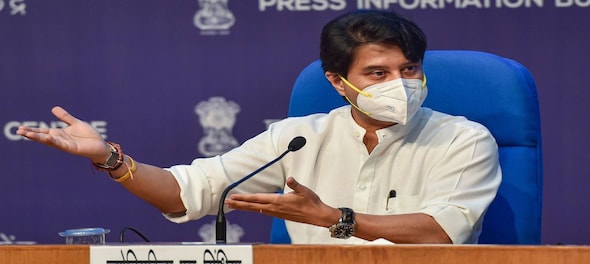
During a press conference on Wednesday, Jyotiraditya Scindia, India's Civil Aviation Minister, emphasised the significant transformations witnessed in the country's aviation sector over the past nine years.
One of the most noteworthy achievements highlighted by Minister Scindia was that India has successfully secured its position as the world's third-largest aviation market. Over the past nine years, India has experienced a staggering 130 percent jump in domestic air travel, with an estimated 145 million passengers travelling annually within the country, he added.
Furthermore, the international passenger movement has also witnessed a notable upswing, recording a 50 percent increase. Approximately 70 million passengers now travel internationally each year, illustrating the growing outbound travel aspirations of the Indian population.
In addition to the passenger segment, cargo movement has also experienced substantial growth, with a 35 percent increase over the past nine years. The total cargo movement now stands at 3.6 million tonnes (MT).
Minister Scindia also highlighted that India now boasts a fleet of over 700 aircraft, representing a remarkable jump of more than 100 percent over the past nine years.
Simultaneously, the Indian government has undertaken significant efforts to improve airport infrastructure, with 11 new Greenfield Airports being constructed in the past nine years.
Notably, the North East region has received particular attention in terms of airport development. Minister Scindia highlighted the successful construction of eight new airports in the region.
The minister also revealed that a capital expenditure (Capex) push of Rs 1 lakh crore is currently underway in the aviation sector, with an expected contribution of Rs 70,000 crore from the private sector. The minister also highlighted the positive changes observed in Air India after its takeover by Tata Group.
Minister Scindia expressed optimism about the future of the aviation industry, stating that the ongoing capex push is set to revolutionise the sector. The investment of Rs 1 lakh crore will enable the development and modernisation of aviation infrastructure, further enhancing connectivity and contributing to economic growth.
"The civil aviation sector in India operates as a deregulated industry, with our primary role being that of a facilitator. Over the past few years, numerous regional airlines have been established, and it is crucial not to overlook the success stories of these new carriers," Scindia told CNBC-TV18.
On the surge in airfares, Scindia said, "The high ticket prices can be attributed to the combination of high demand and a freeze on capacity. Notably, only a few cities are experiencing significantly elevated pricing. In light of this, we have urged airlines to rationalise their pricing strategies. Encouragingly, maximum prices have recently seen a decrease ranging from 14 percent to 61 percent," he said..
In a significant development, Minister Scindia highlighted the positive changes witnessed in Air India since its takeover by the Tata Group. Following the acquisition, Air India placed the biggest order in the history of aviation.
Additionally, Minister Scindia emphasised the government's efforts to support the maintenance and repair sector by ensuring reduced rentals for Maintenance, Repair, and Overhaul (MRO) service providers.
Looking ahead, Minister Scindia stated that India is expected to have over 200 airports within the next five years with leasing process for 29 aircraft at Gift City, a planned financial and technology hub in Gujarat.
Furthermore, Minister Scindia highlighted the significant adoption rate of the Digi Yatra initiative at airports under the Airports Authority of India (AAI). More than 50 percent of the airports under AAI have implemented Digi Yatra, a digital travel experience for passengers that streamlines various processes.
However, Minister Scindia acknowledged that private airports currently have a lower adoption rate of Digi Yatra, ranging from 10-20 percent.
Highlighting the government's vision for aviation in India, he said that discussions are currently underway with leading airlines, including IndiGo and Air India, to leverage Delhi's strategic location and further enhance its connectivity with international destinations.
In line with the government's commitment to sustainability, Minister Scindia emphasised the importance of promoting the usage of Sustainable Aviation Fuel (SAF). SAF is an environmentally friendly alternative to traditional aviation fuel, as it significantly reduces greenhouse gas emissions and contributes to a greener aviation sector.
Furthermore, Minister Scindia expressed a strong desire to bolster aerospace manufacturing in India. By promoting domestic manufacturing capabilities, the government seeks to position India as a global hub for aerospace manufacturing and attract investments from international players.
Minister Scindia hailed the Tata Airbus project as a significant boost for employment and micro, small, and medium-sized enterprises (MSMEs) in India.
First Published: Jun 7, 2023 2:51 PM IST
Check out our in-depth Market Coverage, Business News & get real-time Stock Market Updates on CNBC-TV18. Also, Watch our channels CNBC-TV18, CNBC Awaaz and CNBC Bajar Live on-the-go!


Two days left for filing nomination, Congress undecided on candidates for Amethi and Rae Bareli seats
May 2, 2024 7:32 AM
Lok Sabha polls: Polling time in Telangana increased by an hour, here's why
May 2, 2024 6:55 AM

